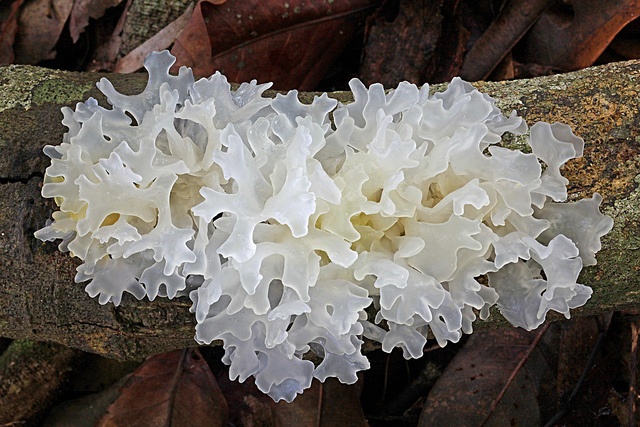
Tremella fuciformis
Other names – Bai Mu Erh, Shirokikurage, Silver Tree-ear, Fungus, White Jelly-leaf, White Muer, White Tree-ear
Snow fungus is a white, nearly translucent, “trembling” fungus that grows on a great variety of trees throughout Asia and in warmer climates worldwide.
Uses
Snow fungus is an immune stimulant that fights infection, especially chronic infections. Studies have found that it also demonstrates antitumor activity, lowers levels of low-density lipoprotein (LDL, or “bad” cholesterol), protects the liver, and fights inflammation, and that it may slow the aging process. Supposedly, if snow fungus is eaten regularly, facial freckles will disappear, although this has not been tested in any scientific fashion.
Benefits of snow fungus for specific health conditions include the following:
Atherosclerosis and high cholesterol. In Japan, snow fungus is used to prevent atherosclerosis, in which cholesterol gathers into plaques within the arteries. It does this by lowering total blood-cholesterol levels. To date, however, only one preliminary clinical study has confirmed the value of snow fungus for this purpose. However, research on snow fungus polysaccharides as infection-fighters has confirmed that they help maintain cholesterol levels in the linings of cells, where cholesterol is needed, possibly helping to draw it out of the bloodstream.
Cancer – Scientific studies have found that the mucilage like polysaccharides found in snow fungus fit like keys into receptor sites on certain immune cells. This increases the production of interferon and interleukin-2 (IL-2), two important immune-system chemicals, and stimulate the production of germ-eating macrophages. Snow fungus also increases the activity of natural killer (NK) cells and enhances the effectiveness of antibodies. In addition, snow fungus reduces the rate at which cancers spread. In order to grow and spread, tumors have to establish their own blood-vessel systems. Snow fungus compounds counteract a blood chemical called platelet-activating factor (PAF), which makes the blood less likely to clot and spin a fibrin “net” on which blood vessels to serve the tumor can form.
Laboratory tests have demonstrated that snow fungus extracts kill cervical cancer cells, as well those taken from other types of tumors. Snow fungus is known to sensitize the cervix and uterus to radiation treatment, making that treatment more effective. One of the most valuable medical uses of snow fungus is to prevent leukopenia, or low white blood cell counts, in people undergoing chemotherapy or radiation treatment for cancer
Wood Ear Fungus